How Many Videos To Get 1,000 Subscribers
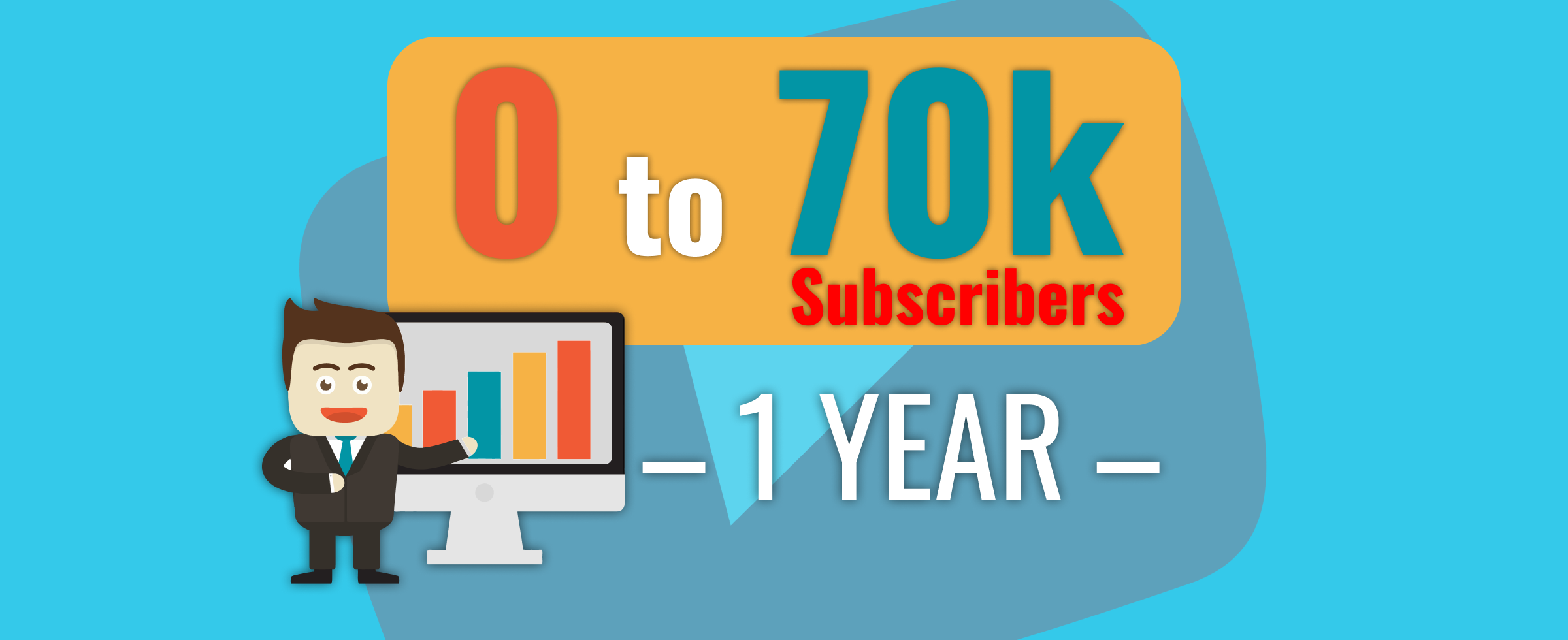
It's hard to believe that it has already been 1 year since I started my YouTube channel, codeSTACKr.
In this article, I want to be open and transparent about everything that has gotten me to where I am now, the good decisions as well as bad. And I hope that you can take this information and apply it to your circumstances.
I believe that no matter what category or niche you may be in, this information can help you to grow your channel as well.
This post is not meant to brag. Rather, it's meant to provide insight into how I quickly grew my YouTube channel.
I hope that this post will help you in some way, but what worked for me is not guaranteed to work for you. So adapt my methods to meet your needs.
All of these strategies and tricks can also apply to blogs and any other social media platforms.
Let me get started by giving you a little background on myself and why I started a YouTube channel.
How It All Started
There are many reasons that people start a YouTube channel. It could be for fame and notoriety, to make money, to help people, or maybe just as a hobby. Well, I started my channel to prove a point.
You see, I have 2 teenagers, and they are typical teenagers. I wanted to challenge them to come up with a business idea. You know, instead of playing video games, watching Netflix, or chatting with their friends all day.
As you can expect, there were not many ideas being passed around. So I thought, maybe they could start YouTube channels and make content about things they enjoy doing. My son could start a gaming channel and my daughter could start a hair-styling channel.
They seemed to think it was an okay idea. My son downloaded a screen recorder and was going to create some videos. I helped my daughter set up a tripod and camera so she could record some fancy hair braids.
And that's about as far as they got. No videos ever got posted.
That's when I came up with the idea to start my own channel. I wanted to prove a point: you can make something successful if you put in the effort.
I decided that I was not going to tell anyone, not even my wife, that I started the channel until I had proof that it was successful. I thought, "if I can get 300 subscribers I'll tell them".
Choosing a topic for your channel is, in my mind, the most important decision. You want to pick something that is not too broad, but also not too narrow. You want to appeal to a specific, targeted audience.
The topic of my channel was a no-brainer. I've been coding since I was 12 and it's a topic that I'm passionate about. So talking about web development made sense.
I had been watching other channels like Brad Traversy, Academind, and The Net Ninja for years. So I started with a tutorial on VS Code.
We'll get to more about my channel and videos later. For now, let's talk about motivation and expectations for starting a channel.
Motivation & Expectations
When starting a YouTube channel, a blog, or any social media account, you need to understand what your motivation is and what you expect to get out of it.
For me, I wanted to prove something to my kids. Are you trying to become famous? Do you want to make money? Do you want to help people in some way?
Whatever your answer is, you need to understand that you will not see results overnight. It could take months, even years to even see any results.
This is where expectations come into play. If you can manage your expectations, then you will be able to withstand the ups and downs that are sure to come.
When choosing the topic of your channel, make sure that it is something that you are passionate about. If not, you'll be setting yourself up for failure. It will only be a matter of time before you get bored and give up.
Getting Started
The first thing that I did was pick a channel name. Honestly, I don't remember why or how I landed on codeSTACKr.
I went to namecheap.com and was looking for domains. I was looking for combinations of "code", "full", "developer", "stack", etc. I remember that codestack was taken, so I added an "r" to the end ?.
The next step was to record the video. I decided that I was not going to spend a dime on this channel to start with. If I made any money from it, then I would invest that money back into the channel.
Since I would be sharing my screen, I didn't need a camera. I could just use a screen recorder. I used OBS for that, and I still do.
If you will be starting a channel that requires a camera, start with the webcam on your laptop or your phone. Most phones have great cameras.
If you are going to spend any money, the first area I would recommend would be on audio. Audio is by far the most important asset to any video. It will make or break your channel in my opinion.
When I watch a video and the audio quality is not there, I will most likely move on to another video.
For my first several videos, I just used a headset mic. Like one that you would use for gaming or even earbuds from your phone.
Once I got everything recorded, then I needed to edit the video. There are a few options for this. If you have a Mac, then iMovie is a great option. I have a Windows computer, so I use Davinci Resolve. It is free and is very robust. It is also available on Mac and Linux.
Now it's time to post the video. This is where some get hung up.
I know it's nerve-wracking to upload the first video, and you want it to be perfect. But don't obsess over this. It will never be perfect, no matter how much time you spend on it. Just upload it!
That is exactly what I did and it was not perfect. I had a blaring misspelling in my video that I still get comments on to this day. ?
Results From The First Video
Before I posted my video I did some research. I wanted to find places to promote the video. I had zero following on any other social platform. So, I started looking at Reddit and found a subreddit where I could post the link to my video.
I know that self-promotion on Reddit is frowned upon. So be very careful there. I found a subreddit that allowed this type of posting, and I made sure that I was not breaking any rules.
I also researched SEO for the video. I made sure that the title, description, and tags were optimal for the video. That in itself is an entire article.
Now it was time to post. I nervously clicked the button. Then hit refresh frantically for several minutes to see if there would be any views. Nope, no views. So I posted the video link on the subreddit. That worked! I started to get a few views.
The day after I posted the video, we left for vacation. I took every chance I could get to inconspicuously check my YouTube analytics while we were gone. It's hard not to get caught up on the numbers, but try not to. And we'll talk more about that in a bit.
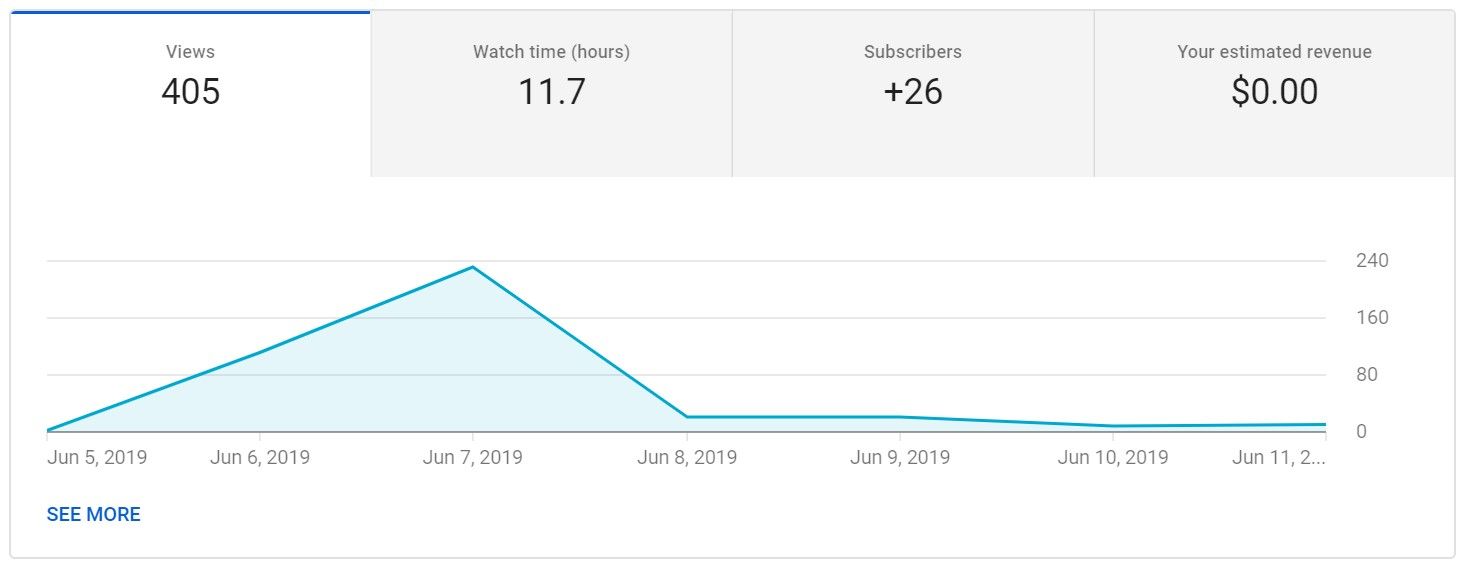
On the first day, I got 111 views and 8 subscribers. The next day was 231 views and 14 subscribers. Then the views dropped down to 23 and 2 subscribers. These mostly came from the Reddit post. On that first Reddit post, I got 88 up-votes. That's pretty good for Reddit.
You'll find that this is a typical graph for most videos. You will get a spike in initial views, then they level off. At some point, you hope that the YouTube algorithm will pick it up. We'll talk about that in a bit.
So how did I go from getting a few views per day to thousands per day? That's coming up next.
Consistency
The number one thing that will help you grow your channel, which I'm sure you've heard before, is posting consistently.
Come up with a plan that works for you. If you can post once a week, once every two weeks, or once a month, stick to it! You will not get subscribers if you are not consistent.
For me, I have a full-time day job. So after we got back from vacation, I decided that I could find the time to post once a week. So I stuck to that. I posted consistently, at least once per week. Every post bumped up my average views.

You can see from this graph that in June, 2019 I posted three videos. You can also see the gap where I was on vacation. Each post gave me a bump in views and subscribers, not only for the video being released, but also for the previous videos.
You'll find that some videos get more views than others. You will have videos that do great and others that flop. Use these insights to hone in on what your viewers want to see. If a video does well, then make another video on the same or similar topic.
Consistency is what got me to my 300 subscriber goal after about 10 videos and 2 months.
Revealing My Secret ?
So I sat my family down to tell them the good news. Imagine, a 39-year-old father and husband sitting his wife and 2 teenagers down to tell them that he has created a YouTube channel and has 300 subscribers. ?
After the chuckles were over I proceeded to inform them of my plans to continue growing the channel and see where it could go.
Avoid Burnout
Understanding that consistency is a marathon and not a sprint is very important. During January 2020 I decided that I was going to post a short video every day. I wanted to create short videos that explained small parts of JavaScript. I called it #JavaScriptJanuary.
These were about 90 second videos. You might think that short videos would be easier to make. And in theory, they should be.
But I tend to overdo things. I made sure that these videos were packed full of info. They had animations and were very engaging. On average, they each took 3 hours to make. ?
That was a bad decision. Don't get me wrong, I am proud of the videos that I created. I have gotten many compliments on them and thankful viewers who love them and want more.
But it was very hard to keep up with the schedule. I did manage to get a video out every day, but I will never do that again.
What did I learn from my mistake? Even though I posted a video every day, I did not see a significant increase in views or subscribers. In fact, I lost some subscribers because they did not like me flooding their home page with new videos every day.
When you first start your channel you will be very excited to get going and want to work all of the time. Be very careful, pace yourself, and don't sign yourself up for more than you can handle, or more than your audience can handle.
To engage with my viewers, I responded to every comment on every video. Your viewers want to know that they are being heard.
This has been one of my keys to success. By engaging with the viewers I have been able to adjust my content strategy to include topics that they are interested in watching.
You may think that you know what your audience wants, but you really don't until you ask them what they want.
Market and community research is critical to growing your brand. You need to understand who the big players are and try to interact with them as well, as much as possible.
Now, if you are just starting, you wouldn't want to bug a large channel asking for things. You want to engage with the community and bring value.
One of the first real engagements that I had was with freeCodeCamp.org. I was able to create a 2 hour long tutorial on Sass for them to post on their YouTube channel. At the time, their channel had around 1 MILLION subscribers!

In this graph, you can see the spike in subscribers that I got from posting my video on the freeCodeCamp.org's YouTube channel.
By this time I had acquired around 500 subscribers. Then I got over 300 in one day! I was shocked and amazed. Of course, it leveled back off eventually. But notice that with every bump, the average increases. Each one takes you to the next level.
Another thing that has helped me is getting to know others in my community. You would think that other YouTubers that post videos on the same topic would be competition. But that is not true at all.
I was able to collaborate and share insights with many in my community that post about the same things as I do. Even though we may post about the same subject, we all have different methods of teaching and different viewpoints. So it's not a big deal.
Bottom line: you need to network and get to know others that are in the same niche as you.
The Elusive Algorithm
The YouTube algorithm is an enigma. Don't try to understand it. Just know that when it finds you, you will know it!
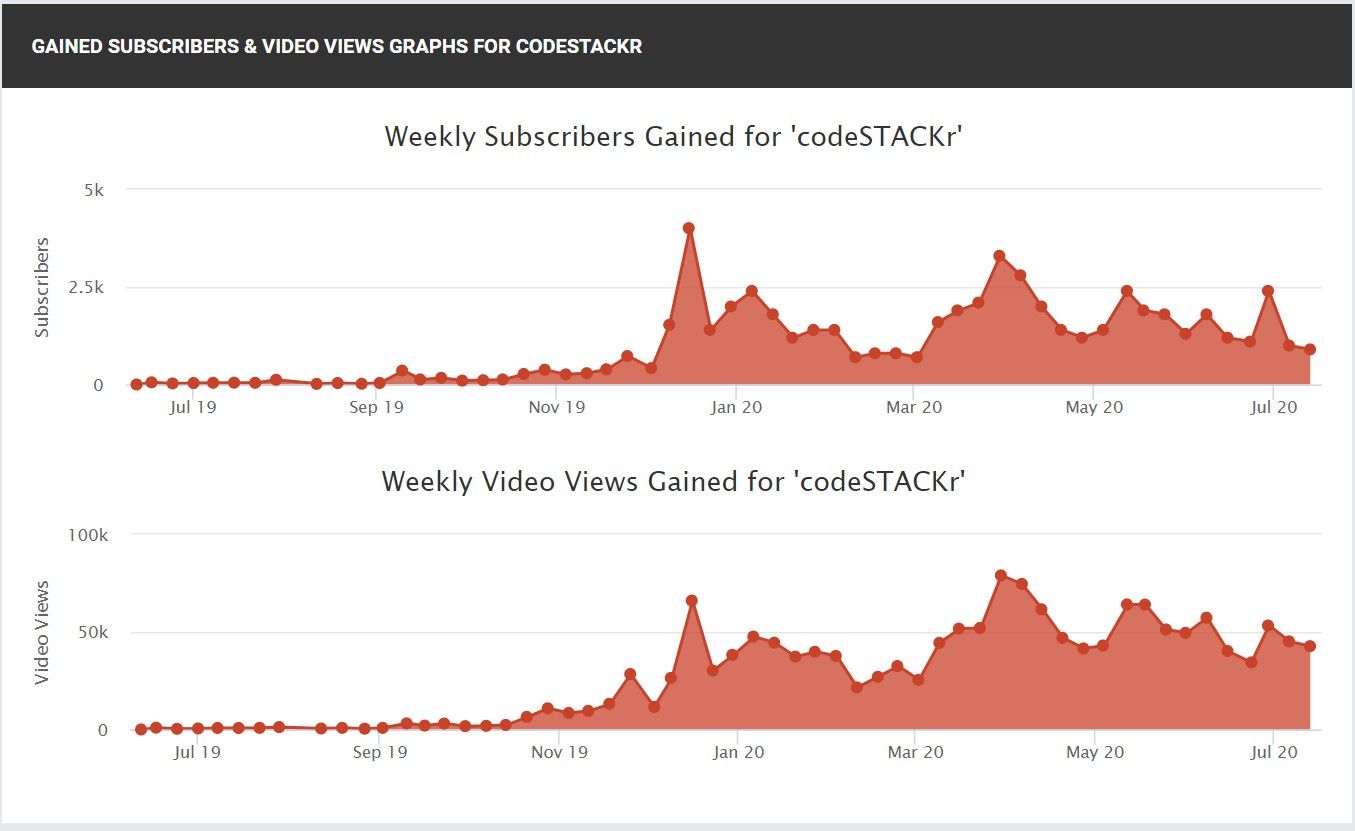
Notice in the graph the large spike around December, 2019. That is when the mighty algorithm decided to push one of my videos to tens of thousands of viewers.
I was averaging 1,000 views a day at that time. Then, all of a sudden, I was getting 12,000 views in one day. That then took me to the next level. I didn't do anything different. I was consistently posting one video per week.
You can see in the next graph the trajectory change around December, 2019.
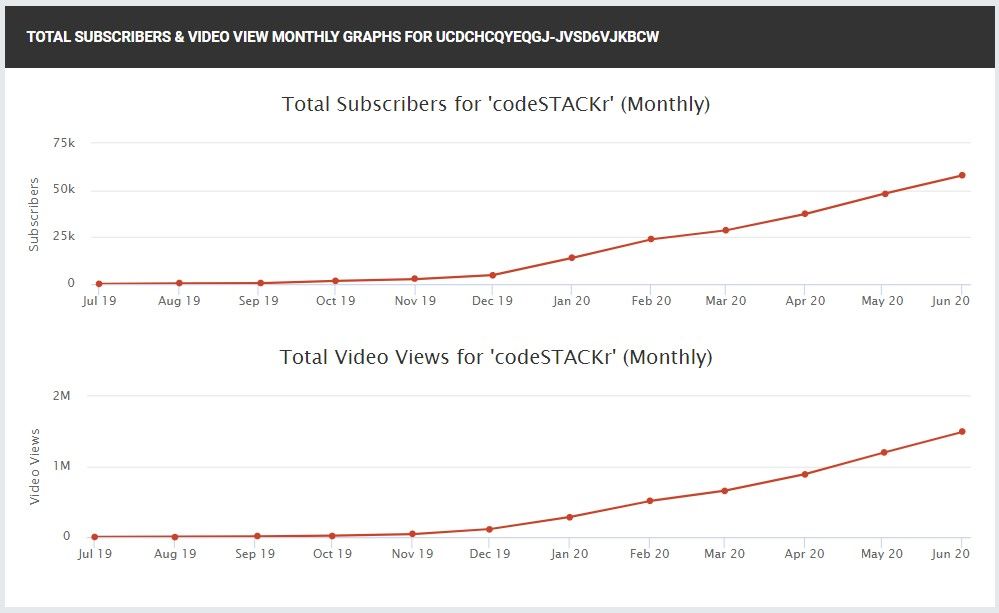
Since then, the algorithm has picked up several of my videos. By staying consistent, listening to my audience, and interacting with my community, I was able to gain 70,000 subscribers and almost 2 million views in a year. Craziness!
Don't Get Stuck On The Numbers
I initially set the goal of getting 300 subscribers. For me, at the time, that was the number that would mean I was successful and that my strategies were working.
That was another mistake. Try your hardest not to focus on numbers. Your number of subscribers or followers does not define your success. The quality and value of your content is what defines your success. If you have quality and valuable content, they will come.
And... Do not compare yourself with others. Every journey is different. Focus on your circumstances, remain consistent, and produce quality content.
Highs & Lows
Looking back at some of the graphs you will see peaks and valleys. That is totally normal. Don't get scared when your views start to drop. It's the natural cycle of YouTube. They will pick back up as long as you stay consistent.
Monetization
On YouTube, you are required to have 1,000 subscribers and 4,000 watch hours to be monetized. That's 240,000 minutes of watch time!
I hit 1,000 subscribers after 3 months, in September of 2019. But I didn't hit 4,000 watch hours until November of 2019. That's 5 months after starting my channel.
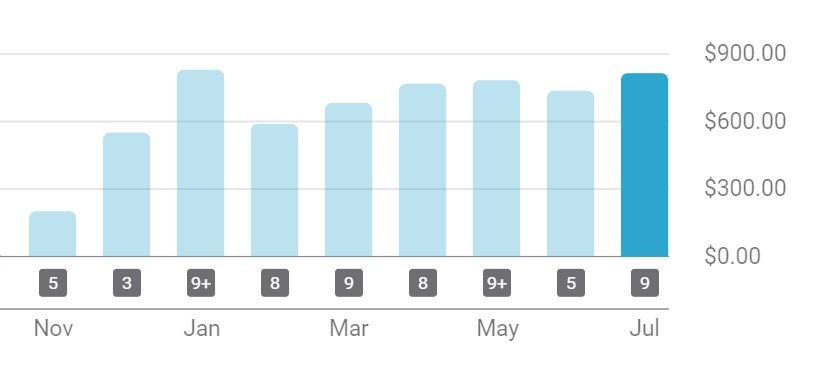
In November I made $197. ? I could not believe that I was making money uploading videos to YouTube! In December I made $545. Then in January, which was right after the algorithm picked up one of my videos, I made $830!
After that, the revenue drops off but has leveled off and has recently begun to increase. After 8 months of monetization, I made just over $5,000.
That's not enough for me to quit my day job, but I am still amazed that I have been able to create side-income so quickly.
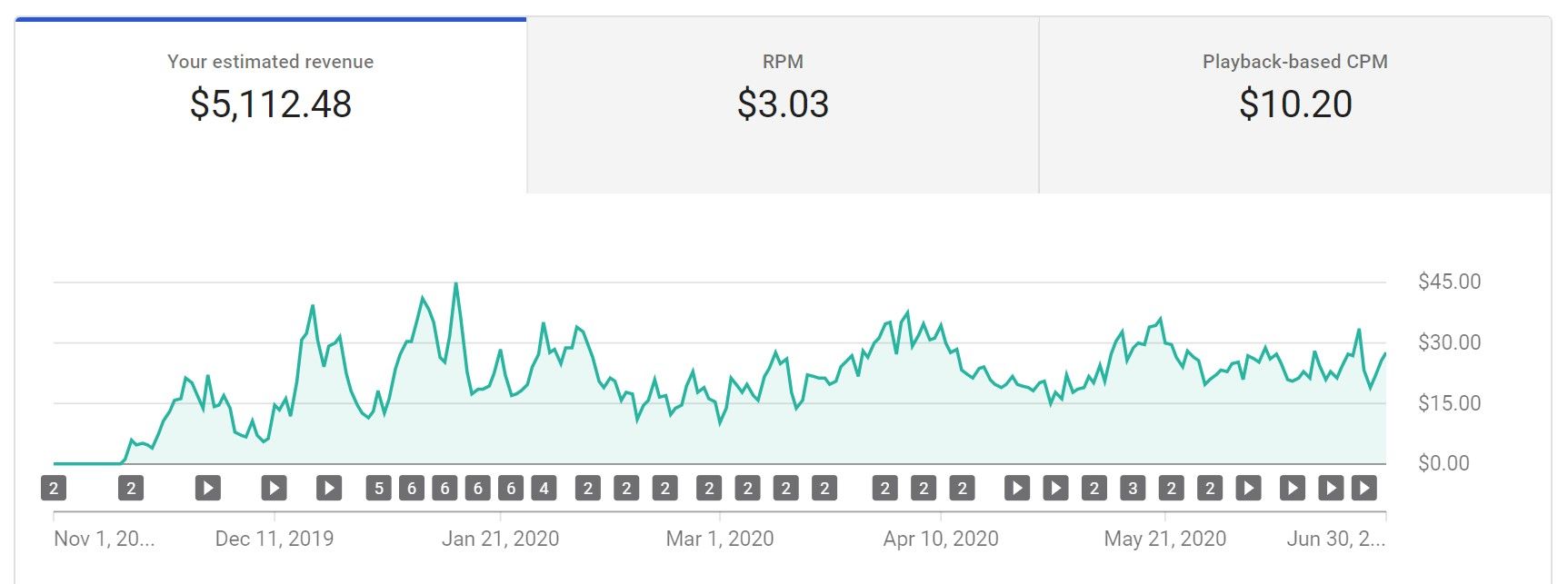
In this graph, you will see the weekly ad revenue breakdown. The other two stats are part of what the revenue is based on.
CPM is "Cost per Mille", or simply the price that an advertiser pays per 1,000 views of a video. My average CPM here is $10.20. So advertisers paid $10.20 per every 1,000 monetized views of my videos.
RPM is "Revenue per Mille", or simply the revenue that you earn per 1,000 views of a video.
Since YouTube is facilitating these views, they take a cut, and I'm OK with that. They own the platform, they maintain it, they send viewers to my channel, they do most of the heavy lifting. Plus they provide many great tools for content creators and are constantly adding and improving on these. So, $3.03 is what I made per 1,000 monetized video views.
Now, not all views count. Notice that I said "monetized" views. Which means that the ad was seen. If the viewer is using an ad-blocker or they skip the ad, it will not count as a monetized view.
Other Sources of Revenue
Besides the ad revenue, I also made approximately $8,000 from sponsors in the past year. This is not something that comes right away. You have to build your brand and become known in the community.
I have not gotten a single sponsorship by reaching out and asking for sponsors. All of my sponsors have reached out to me first. So, again, it's a marathon. Don't expect things to happen overnight. Stay laser-focused and good things will come.
In any business, you want to diversify your income. YouTube ad revenue should never be your main source of income. What if YouTube accidentally deletes your account, or for some reason stops monetization? You have to diversify!
Besides YouTube ads revenue and sponsors, my goal was to create my own digital products.
This is an example of another mistake that I made. The mistake was not the decision to make my own products, but my delay in making them. In fact, to this day, I still have not released any products.
I planned to release 3 premium courses in 2020. We are over halfway through the year and I have not released 1.
I got caught up in other side projects and did not focus on my own projects. These other side projects brought in subscribers and money for me but they should not have been my main focus.
Your main revenue stream should be your personal products. That is what you control. Everything else could one day disappear. Stay focused!
Tips For Success
The biggest tip for success that I could give you is to focus. It is so easy to get distracted by all of the things that you "could" do to increase your reach.
Focus on making quality videos. Try to stay organized. Create a list of content that you want to create. Every time you think of a new idea, add it to the list.
But, focus on one topic at a time. Create the content for that video, then move on to the next topic.
Earlier I said that when I started my channel that I did not have a presence on any other social platforms.
If you already have a following somewhere else, then you should use that to your advantage to bring viewers to your channel. But if you don't have a following elsewhere, don't try to grow multiple platforms at the same time. Stay focused on whatever platform is working for you.
After I got my YouTube routine down, which was after about 6 months, I started an Instagram, Facebook, LinkedIn, and Twitter account. I have slowly grown on these platforms as well, some better than others. (I have no idea how Facebook works ?.)
After several months on these platforms, they have had a very minimal impact on my YouTube growth. I think that, for my niche, Twitter and Instagram have been the most effective. Twitter especially for networking. But the impact from these on my channel has not been significant.
Depending on your niche, you may find that your audience may be more receptive on specific platforms. Use these for brand building once your channel gets a bit of traction.
If you want to revisit the concepts in this article via video, you can check out this video-version I made here.
Conclusion
In conclusion, I just want to say that anyone can do anything. If you have (1) the proper motivation, (2) realistic expectations, and (3) you don't overwork yourself, you can be successful.

I'm Jesse from Texas. Check out my other content and let me know how I can help you on your journey to becoming a web developer.
- Subscribe To My YouTube
- Say Hello! Instagram | Twitter
- Sign Up For My Newsletter
Learn to code for free. freeCodeCamp's open source curriculum has helped more than 40,000 people get jobs as developers. Get started
How Many Videos To Get 1,000 Subscribers
Source: https://www.freecodecamp.org/news/how-to-grow-your-youtube-channel/
Posted by: norrisrues1974.blogspot.com

0 Response to "How Many Videos To Get 1,000 Subscribers"
Post a Comment